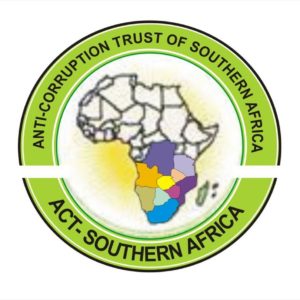 Country: Zimbabwe
Country: Zimbabwe
Social media: Facebook, Twitter
Focal point: Obert Chinhamo, Director
Email: email hidden; JavaScript is required
Tel: +263(0)552525235
Vision
Accountable, transparent and legitimate public and private sector institutions operating alongside a well informed empowered and actively engaged citizenry.
General description of your work in the prevention of and the fight against corruption
ACT-SA carries out several activities linked to the prevention of and the fight against corruption:
- The organisation monitors and reports on the status of signature, ratification and domestication of the UNCAC and other instruments such as the SADC Protocol against Corruption and the AU Convention on Preventing and Combating Corruption. The reports are largely used by Member States, CSOs, students and the academia among others;
- As part of efforts towards monitoring the extent of domestication of anti- corruption treaties, ACT-SA has developed a Tool, which scores the extent of the domestication thereof.
- ACT-SA uses the reports afore-said for evidence-based advocacy. In keeping thereof, the organisation has several exchanges between it and some SADC Member States in which it was urging them to sign, ratify and domesticate anti- corruption treaties. Advocacy strategies include writing letters, issuing media releases, posting on websites and twitter handles.
- ACT-SA empowers communities to monitor, report and take action against corruption. Methods used includes trainings, use of manuals, mentoring as well as technical support, especially when it comes to the reporting of corruption cases without the communities being harmed;
- Documentation of corruption cases and advocacy against it. ACT-SA produces corruption reports and uses them for advocacy purposes. In addition to annual reports for specific countries, the organisation is producing a regional report on the state of corruption in Southern Africa.
- Anti-Corruption trainings for the micro, small to medium enterprises. With support from UNODC, ACT-SA is implementing the project in Zimbabwe which seeks to empower these micro, small to medium enterprises to shun corruption and report it in order to stimulate growth. After training, the participants are given manual and technical support.
Describe your organisation’s work linked with the UNCAC
The Anti-Corruption Trust of Southern Africa (ACT-SA) is not only a member of the UNCAC Coalition but has extensively worked on the UNCAC, especially on the following:
- As from 2007, and many years thereafter, ACT-SA was producing reports on the status of signature and ratification of the UNCAC by SADC Member States;
- The organisation used the reports to facilitate evidence-based advocacy. In keeping thereof, ACT-SA heavily lobbied for the signing, ratification of the UNCAC by SADC Member States. The special case was that of the Kingdom of Swaziland;
- Produced a tool to measure the extent of domestication of the UNCAC by Member States;
- Conducted trainings on the UNCAC targeting CSOs and communities in Zimbabwe;
- Currently, developing a Compendium of Anti-Corruption Treaties, which encapsulates the UNCAC;



